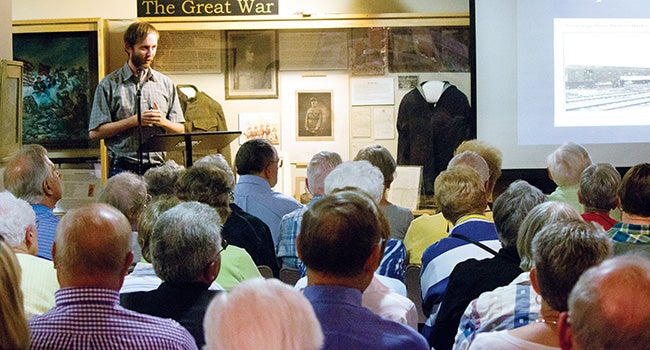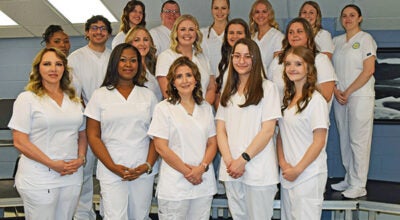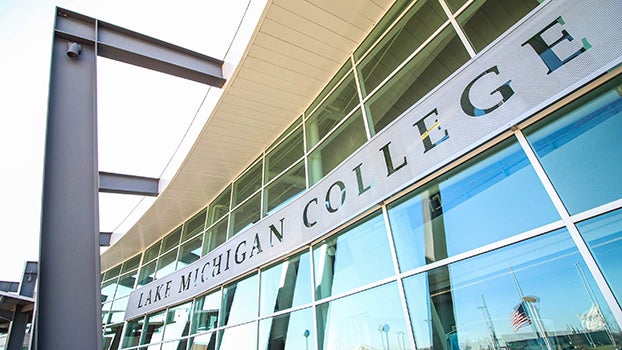Archivist discusses history of House of David
Published 11:01 am Friday, June 9, 2017

- Area archivist David Kohrman shows off one of the photos from the House of David records during his presentation at the Dowagiac Area History Museum Wednesday. (Leader photo/TED YOAKUM)
While they always kept one eye on the spiritual world, House of David founders Benjamin and Mary Purnell never passed up any opportunities that emerged in the business one, either.
At its peak, the Benton Harbor-based religious commune headed up what could only be described as its own commercial empire: farms, a lumber field, a hotel, several bands and baseball teams, and, most famous of all, an amusement park. However, the community was eventually brought down — not through the faults of its leaders’ business acumen, but through scandal and infighting.
On Wednesday, area archivist David Kohrman shared the history and legacy of the House of David in his presentation, “Baseball, Amusement Parks and Faith: A History of the Israelite House of David,” at the Dowagiac Area History Museum. Kohrman’s talk — the last in this season’s lecture series — drew yet another packed house to the basement of the Dowagiac institution that evening, where he showcased a number of photos from the archives of the religious colony.
The Purnells founded The House of David in 1903 in Benton Harbor, after breaking off from another religious order known as the “Visitation Movement.” The couple believed that the nations of Israel would gather together to greet the second coming of Jesus Christ at their site in Benton Harbor, Kohrman said.
Similar to the Shakers religious sect on the East Coast, members of the House of David lived a communal lifestyle. Believing that the body was just as sacred as the soul, members strived to keep themselves in good shape, and had strict vegetarian diets.
Like the Shakers, members were also celibate, Kohrman said.
“Residents of the House of David did get married — but they weren’t expected to have children,” Kohrman said. “If a baby showed up, you were going to have some explaining to do.”
Members also stood out due to the fact they did not cut their hair nor shave, Kohrman said.
At its peak, the colony had around 1,200 members, hailing from throughout the U.S. as well as from countries such as Scotland, Australia and New Zealand, Kohrman said.
The colony lived in several different buildings, including the twin buildings of Bethlehem and Jerusalem, the stone mansion Shiloh and, most striking of all, the Diamond House.
“It was the first to incorporate a mineral called hematite mixed into the concrete blocks,” he said. “When the sun shines on it, it gives it this sparkly, diamond-like effect, hence the name. On certain days, the effect is quite dramatic.”
Curious about their unusual lifestyle and appearance, locals often wandered onto the premises. Rather than crack down on trespassers, the Purnells decided to capitalize on the interest around their community, establishing a miniature zoo and ice cream parlor to draw in people — and raise money for the colony.
In 1908, the Purnells purchased a piece of land nearby the colony and established the House of David’s most famous attraction, the Eden Springs amusement park.
The establishment attracted visitors from throughout the area, and featured rides and attractions such as miniature trains and cars, a vegetarian-only restaurant, and a man-made pond for watersports. It also featured a bowling alley, where it is commonly believed that operators created the first mechanical pinsetter, Kohrman said.
“If they didn’t invent it they were certainly the first people in the area to actually use them,” Kohrman said. “They actually manufactured and sold the pinsetters themselves.”
House of David members also formed several touring bands, which became quite an attraction due to their long hair and beards, Kohrman said. The group also established several baseball teams, which made names for themselves traveling the country and challenging local teams.
“Quite often they would challenge major league teams — and come out on top,” Kohrman said. “They won around 80 to 90 percent of the games they played.”
In spite of the commercial success of these and other ventures led by the Purnells, the colony found itself embroiled in controversy in the 1920s, when several women alleged that Benjamin had sexual relations with them while they were still minors. The patriarch was eventually arrested, though he was never convicted before his death in 1927.
“This was how his life ended,” Kohrman said. “Trying to defend his life’s work from a hospital bed.”
After Benjamin’s death, the House of David found itself embroiled in conflict from within: between Mary, his widow, and Judge Dewhirst, another leader of the colony. The conflict was eventually resolved, with Dewhirst taking the reigns of the existing lands and Mary breaking off to form her own colony nearby, the New Israelite House of David, which is more commonly known as Mary’s City of David.
Today, much of the original colony still stands. While Eden Springs closed in the 1970s, the land was purchased in 2009, and some of the structures from the park remain intact.






